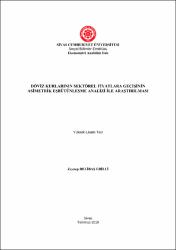| dc.contributor.advisor | Türkay, Hakan | |
| dc.contributor.author | Delibaş Erilli, Zeynep | |
| dc.date.accessioned | 2020-02-27T06:22:57Z | |
| dc.date.available | 2020-02-27T06:22:57Z | |
| dc.date.issued | 2019 | tr |
| dc.date.submitted | 2019-07-12 | |
| dc.identifier.other | XIV, 79 sayfa | |
| dc.identifier.uri | https://hdl.handle.net/20.500.12418/12265 | |
| dc.description.abstract | Döviz kurları, gelişmekte olan ülkelerde, uzun yıllardan beri Makroekonomik
politikalar içinde önemli bir yer tutmaktadır. Döviz kurlarında meydana gelen
değişmeler, ekonomide birçok değişken üzerinde beklenenden daha çok etki
yaratabilmektedir. Türkiye gibi daha çok ihracat yapmak için daha çok ithalat
yapmak zorunda olan ülkelerde ise, döviz kurlarında meydana gelen şokların
ekonomide yaratacağı etkiler daha büyük olabilmektedir. Bu etkilerden biri de döviz
kurundaki değişmelerin Yurtiçi fiyatlar üzerindeki etkisidir.
Döviz kurundaki değişimlerin ekonomiye etkisi üzerine yapılmış birçok
çalışma vardır. Bu çalışmada; döviz kurlarındaki değişimin sektörel fiyatlara
yansıması, asimetrik eşbütünleşme analizi ile araştırılmıştır. Literatürde sıklıkla
kullanılan TAR ve STAR modelleri ile asimetrik yapı modellenmiş ve
yorumlanmıştır.
Uygulamada 2003-2019 yılları arası seçilmiş 13 fiyat endeksinin, dolar ve
avro üzerindeki asimetrik etkileri araştırılmıştır. Elde edilen sonuçlara göre Türkiye
gibi dışa bağlı bir ekonomide, dolar kurunun bazı fiyat endekslerini asimetrik ve
doğrusal olmayan yapıda etkilemekte olduğu görülmüştür. Fakat benzer yapıda
kurulan bağımsız değişkenin avro kuru olarak alındığı modellerde benzer sonuçlar
görülmemiştir. Avro kurunun simetrik ve doğrusal yapılarda fiyat endekslerini
etkilediği söylenebilir. Bunun en önemli sebeplerinden birinin fiyat politikası ve
istikrarının düşük olması, dolar kurunun ihracat ve ithalatta en önemli ödeme aracı
olarak kullanılması gösterilebilir. | tr |
| dc.description.abstract | Exchange rates have been an important part of macroeconomic policies in
developing countries for many years. Changes in exchange rates may have more
impact on the economy than expected. In countries which have to import more to
export more like Turkey, foreign exchange rates may affect the shocks occurring in
the economy will create larger. One of these effects is the effect of exchange rate
changes on domestic prices.
There are many studies on the effects of exchange rate changes on the
economy. In this study; The effect of changes in exchange rates on sectoral prices
was investigated by asymmetric cointegration analysis. Asymmetric structure is
modeled and interpreted by TAR and STAR models which are frequently used in
literature.
According to the obtained results in an economy dependent on the outside,
like Turkey, it has seen some US dollar exchange rate affect the price index of
asymmetric and non-linear structure. However, similar results were not observed in
the models in which the independent variable established in a similar structure was
taken at euro rate. It can be said that the exchange rate affects the price indices in
symmetrical and linear structures. One of the most important reasons for this is the
low price policy and stability, and the use of the dollar exchange rate as the most
important means of payment in exports and imports. | tr |
| dc.language.iso | tur | tr |
| dc.publisher | Sivas Cumhuriyet Üniversitesi Sosyal Bilimler Enstitüsü | tr |
| dc.rights | info:eu-repo/semantics/openAccess | tr |
| dc.subject | Asimetrik Eşbütünleşeme | tr |
| dc.subject | TAR Modeli | tr |
| dc.subject | STAR Modeli | tr |
| dc.subject | Döviz Kuru | tr |
| dc.subject | Fiyat Endeksi | tr |
| dc.title | Döviz Kurlarının Sektörel Fiyatlara Geçişinin Asimetrik Eşbütünleşme Analizi İle Araştırılması | tr |
| dc.type | masterThesis | tr |
| dc.contributor.department | Sosyal Bilimler Enstitüsü | tr |
| dc.relation.publicationcategory | Tez | tr |















